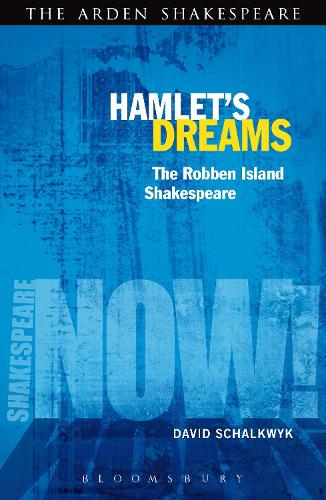
Hamlet's Dreams: The Robben Island Shakespeare
(Paperback)
Publishing Details
Hamlet's Dreams: The Robben Island Shakespeare
By (Author) Dr David Schalkwyk
Bloomsbury Publishing PLC
Bloomsbury Academic USA
31st January 2013
United States
Classifications
Tertiary Education
Non Fiction
Literary studies: c 1600 to c 1800
Theatre studies
822.33
Physical Properties
Paperback
208
Width 129mm, Height 198mm
209g
Description
Hamlet's Dreams brings together the Robben Island Prison of Nelson Mandela and the prison that is Denmark for Shakespeare's Hamlet. David Shalkwyk uses the circulation of the so-called 'Robben Island Shakespeare', a copy of the Alexander edition of the Complete Works that was secretly circulated, annotated and signed by a group of Robben Island political prisoner in the 1970s (including Nelson Mandela), to examine the representation and experience of imprisonment in South African prison memoirs and Shakespeare's Hamlet. The book looks at the ways in which oppressive spaces or circumstances restrict the ways in which personal identity can be formed or formulated in relation to others. The 'bad dreams' that keep Hamlet from considering himself the 'king of infinite space' are, it argues, the need for other people that becomes especially evident in situations of real or psychological imprisonment.
Reviews
A battered Shakespeare annotated by the Robben Island prisoners leads, in David Schalkwyk's hands, to an intriguing meditation on the interplay between Shakespearean texts and the rich field of the South African prison memoir. * J M Coetzee *
At its heart, this is a book about the power of Shakespeare. The context in which we read a play may alter our understanding of it; equally, the play may transform our understanding of the place in which we are. Schalkwyk uses Hamlet as a way to explain the history and political structures of South Africa Hamlets Dreams is about the experience of reading Shakespeare in the particular context of Robben Island; but it is equally about the transformative power of great literature. -- Daniel Swift * The Spectator *
The ambitious project of the Shakespeare NOW! series is to bridge the gap between 'scholarly thinking and a public audience' and 'public audience and scholarly thinking'. Scholars are encouraged to write in a way accessible to a general readership and readers to rise to the challenge and not be afraid of new ideas and the adventure they offer. There are other bridges the series is ambitious to cross: 'formal, political or theoretical boundaries' - history and philosophy, theory, and performance. -- Jan Sewell * English Vol. 58 (223) *
Author Bio
David Schalkwyk is Director of Research at the Folger Shakespeare Library, Washington D.C. and Professor of English at the University of Cape Town, South Africa. He is editor of Shakespeare Quarterly and his books include Speech and Performance in Shakespeare's Sonnets and Plays (Cambridge, 2002), Literature and the Touch of the Real (University of Delaware Press, 2004), Shakespeare, Love and Service (Cambridge, 2008).
